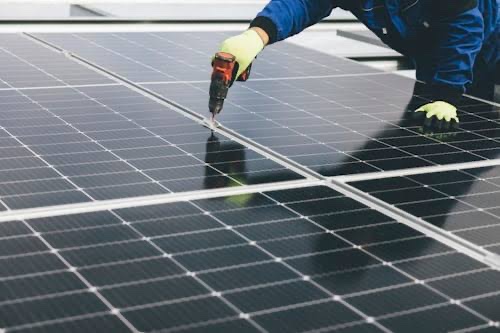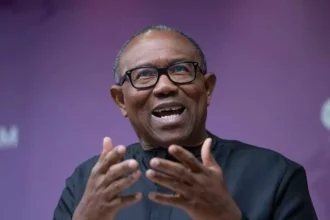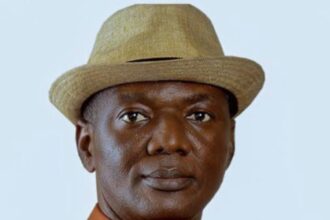
The State House has earmarked N10 billion in the approved 2025 budget for the implementation of a solar mini-grid project at the Presidential Villa, according to *The PUNCH*. This follows a rise in the total budget allocated to the State House Headquarters—from N47.11 billion in the proposed budget to N57.11 billion in the final approved version.
The increase was linked to a surge in capital expenditure, which grew from N33.55 billion to N43.55 billion. A detailed review of the capital components shows the increase stems solely from the planned solar initiative titled “Solarisation of the Villa with Solar Mini Grid,” allocated the full N10 billion. The decision comes in response to ongoing challenges with erratic power supply and the escalating cost of electricity for both the public and government entities.
The project is expected to lessen reliance on the national grid and cushion the effects of rising electricity tariffs on government spending. Electricity rates have continued to spike, particularly for Band A customers who receive at least 20 hours of supply daily. In April 2024, tariffs for Band A soared from N68/kWh to N225/kWh—an increase of more than 230 per cent.
Although subsequently revised to N206.8/kWh and again to N209.5/kWh in July, the tariff remains among the highest in the country.The State House, classified under Band A, has seen its energy costs rise significantly over the past year.It has also struggled with unpaid bills. In February 2024, the Abuja Electricity Distribution Company listed the Villa among the top government debtors, with arrears of N923.87 million.
However, after reconciliation, the debt was revised to N342.35 million. President Bola Tinubu then directed its immediate payment to avoid a power cut, according to the Presidency. This incident highlighted persistent issues with power reliability and rising utility costs at the nation’s seat of power. *The PUNCH* also reported that in 2024, the State House spent N483.34 million on electricity—up 40.17 per cent from N344.82 million in 2023. This data was sourced from GovSpend, a platform that monitors federal expenditure.
A breakdown of the records revealed consistent monthly payments to the Abuja Electricity Distribution Company, with the largest being a lump sum of N316.88 million in October 2024. This payment was categorized as a settlement for “total outstanding electricity debt as at August 2024,” suggesting the State House may have accumulated months of unpaid bills before clearing them at once.
Compared to 2024, electricity payments in 2023 were steadier, averaging between N28 million and N30 million monthly with no lump sum payments recorded. While monthly bills were lower in 2024, the October payment inflated the total yearly spend.For 2025, the Federal Government has allocated N311.09 million for the State House’s electricity expenses. This is outlined in the approved 2025 budget under ‘Electricity Charges’ within the broader ‘Utilities – General’ section. The reduction from 2024’s actual spending suggests plans for more efficient energy use or fewer arrears.Nonetheless, whether the 2025 allocation will be sufficient remains uncertain based on past expenditure trends.
Switching to a solar mini-grid is being regarded as a strategic, cost-saving, and eco-friendly step aligned with broader national energy goals. Apart from the solar initiative, several other significant capital projects feature in the 2025 State House budget. The largest allocation is N11.92 billion, earmarked to clear outstanding liabilities owed to Julius Berger Nigeria and other contractors for work carried out since 2022. This includes maintenance works in Kaduna, the VIP Villa wing, and expenses for utilities and waste management.Another N6.04 billion will go toward routine maintenance of mechanical, electrical, building, and environmental systems across the Villa’s facilities, including those used by the President and Vice President.
An additional N5.49 billion has been budgeted for general maintenance at the Presidential Villa in Abuja. The State House also plans to spend N1.83 billion on acquiring and refurbishing properties previously seized by the EFCC to serve as official residences.Construction of a new office complex for Special Advisers and Senior Special Assistants will proceed with a budget of N1.83 billion. Renovation of four Army residences along Ali Akilu Crescent in the Upper and Lower Artillery Quarters will cost N534.13 million.
A further N120.28 million is allocated for upgrades to the State House security quarters.Other significant capital items include N366.16 million for PMS and ECM equipment, and N38.45 million for new auditing software tools and staff training. The budget also allocates N73.35 million for facility management services at various State House buildings and N73.23 million for the replacement of telecom infrastructure. Digital and administrative upgrades are also a focus, with N50.26 million allocated for maintaining the electronic document system and N56.08 million for office equipment procurement across departments like Finance, ICT, Procurement, and Audit. N25.16 million is also earmarked for data collection to support decision-making.On logistics, N3.66 billion is allocated for acquiring operational vehicles, and N1.09 billion for replacing SUVs.
Tyres for bulletproof and other operational vehicles will cost N164.99 million.Additional items include N12.9 million for State House Library upgrades, N4.59 million for digital medical references, N31.21 million for the animal enclosure and veterinary equipment, N38.45 million for nursery tools and landscaping, and N54.95 million for upgrading the Villa Ranch and constructing a wildlife enclosure. Among all capital projects, the solarisation effort stands out as the most expensive new initiative in the 2025 budget, reflecting a broader government shift toward renewable energy.
President Bola Tinubu signed the N54.99 trillion Appropriation Bill into law in the presence of National Assembly leaders and other senior officials during a brief ceremony at the State House. The budget, passed by both chambers on February 13, was revised upward from Tinubu’s initial proposal of N49.7 trillion.The final figure reflects expected additional revenue from bodies such as the Federal Inland Revenue Service and the Nigeria Customs Service. The budget focuses on priority sectors including security, infrastructure, education, and health, and allocates $200 million to help offset recent U.S. aid cuts to Nigeria’s health sector.
It is based on projections such as producing 2.06 million barrels of crude oil per day at a benchmark price of $75 per barrel. The government also forecasts a N1,500/$1 exchange rate and aims to bring inflation down from 34.8 per cent to 15 per cent by year-end. This budget marks a near doubling—99.96 per cent increase—over the N27.5 trillion budget for 2024. *The PUNCH* had earlier reported that N1.99 billion was allocated to fuel State House generators with diesel in 2025.
This comes as delays continue to plague the FG’s solar rollout, initially scheduled for December 2024 to January 2025.It was reported that N88.75 million was spent on diesel in the first half of 2024 alone.GovSpend data shows four diesel-related payments totaling N88.75 million between March 15 and May 20, 2024. Sources close to the project noted that instability of the national grid, coupled with high diesel costs and generator wear, pushed the Villa toward alternative power.
Senior officials say the planned 40MW solar plant could cut the Villa’s annual N6 billion energy bill by up to N5 billion once operational.Construction of a 1.2MW solar plant began at the State House Medical Centre in October 2024, while no physical work had started at the main Villa site as of February 2025.One official familiar with the project remarked that continuing to rely on diesel-powered generators amid erratic grid power and rising costs was no longer viable.
Source : https://punchng.com/








